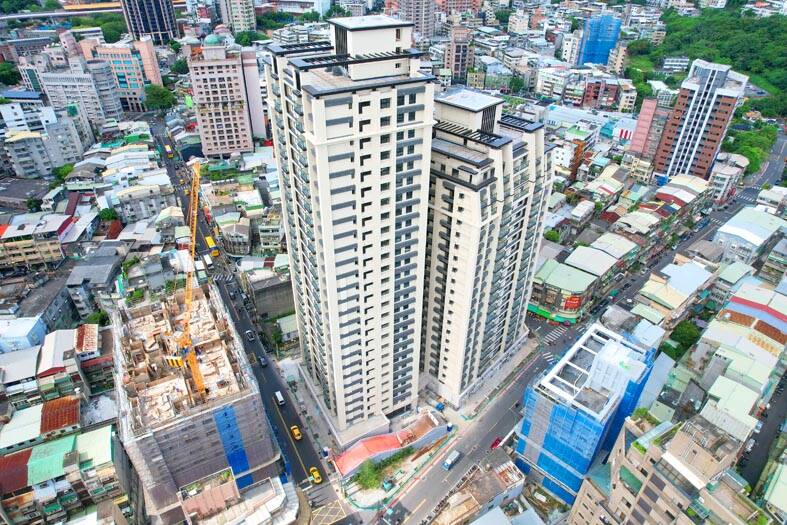The nation’s five major state-run banks extended NT$121.739 billion (US$3.80 billion) in new mortgages last month, the highest amount on record and surpassing the NT$100 billion mark for the third consecutive month, central bank data released yesterday showed.
Total new mortgages extended by the Bank of Taiwan (臺灣銀行), Land Bank of Taiwan (土地銀行), Taiwan Cooperative Bank (合作金庫銀行), Hua Nan Commercial Bank (華南銀行) and First Commercial Bank (第一銀行) last month increased by NT$20.518 billion, or 20.27 percent, from NT$101.221 billion the previous month, central bank data showed.
The monthly increase in new mortgages came as most home buyers tend to strike deals ahead of Ghost Month on the lunar calendar, which began on Aug. 4, resulting in a significant increase in property transactions and housing loans last month, the central bank said.

Photo: CNA
Housing transactions in the six special municipalities last month totaled 26,555 units, a 33.6 percent increase from a year earlier and marking the highest July figure since 2014, data released by local governments earlier this month showed.
In addition, the average mortgage rate charged by the five state-run banks rose 0.003 basis points to 2.187 percent last month from 2.184 percent the previous month, mainly because some banks raised rates for non-first-time home buyers, the central bank said.
The data also showed that preferential loans for first-home buyers under a government program contributed 38.23 percent of the total new mortgages last month, down 2.69 basis points from the previous month, despite that the amount increased from NT$41.42 billion to NT$46.54 billion.
The program has more flexible conditions for loan applications, offers favorable lending terms and sets a lower barrier for young people than a previous similar scheme.
However, it has also drawn wide criticism for rekindling a hot housing market in Taiwan this year.
During the first seven months of this year, the five state-run banks extended NT$672.99 billion of new mortgages, a record for the period and up 84.34 percent from NT$365.08 billion a year earlier, the data showed.
The latest data came after the central bank on Wednesday announced that domestic lenders must come up with self-disciplinary measures by Sept. 6 to limit mortgage operations and prevent an overconcentration of real-estate loans.
It is part of the monetary policymaker’s efforts to cool the housing market after it introduced a new round of credit-control measures last month, as well as hiked lenders’ required reserve ratio by 25 basis points and tightened second-home mortgage terms in June.
Meanwhile, the Ministry of Finance and state-run lenders have also taken actions recently to crack down on abuses of the favorable loan terms intended for first-time home buyers and self-occupancy.

TAKING STOCK: A Taiwanese cookware firm in Vietnam urged customers to assess inventory or place orders early so shipments can reach the US while tariffs are paused Taiwanese businesses in Vietnam are exploring alternatives after the White House imposed a 46 percent import duty on Vietnamese goods, following US President Donald Trump’s announcement of “reciprocal” tariffs on the US’ trading partners. Lo Shih-liang (羅世良), chairman of Brico Industry Co (裕茂工業), a Taiwanese company that manufactures cast iron cookware and stove components in Vietnam, said that more than 40 percent of his business was tied to the US market, describing the constant US policy shifts as an emotional roller coaster. “I work during the day and stay up all night watching the news. I’ve been following US news until 3am

Six years ago, LVMH’s billionaire CEO Bernard Arnault and US President Donald Trump cut the blue ribbon on a factory in rural Texas that would make designer handbags for Louis Vuitton, one of the world’s best-known luxury brands. However, since the high-profile opening, the factory has faced a host of problems limiting production, 11 former Louis Vuitton employees said. The site has consistently ranked among the worst-performing for Louis Vuitton globally, “significantly” underperforming other facilities, said three former Louis Vuitton workers and a senior industry source, who cited internal rankings shared with staff. The plant’s problems — which have not

UNCERTAINTY: Innolux activated a stringent supply chain management mechanism, as it did during the COVID-19 pandemic, to ensure optimal inventory levels for customers Flat-panel display makers AUO Corp (友達) and Innolux Corp (群創) yesterday said that about 12 to 20 percent of their display business is at risk of potential US tariffs and that they would relocate production or shipment destinations to mitigate the levies’ effects. US tariffs would have a direct impact of US$200 million on AUO’s revenue, company chairman Paul Peng (彭雙浪) told reporters on the sidelines of the Touch Taiwan trade show in Taipei yesterday. That would make up about 12 percent of the company’s overall revenue. To cope with the tariff uncertainty, AUO plans to allocate its production to manufacturing facilities in

TARIFF CONCERNS: The chipmaker cited global uncertainty from US tariffs and a weakening economic outlook, but said its Singapore expansion remains on track Vanguard International Semiconductor Corp (世界先進), a foundry service provider specializing in producing power management and display driver chips, yesterday withdrew its full-year revenue projection of moderate growth for this year, as escalating US tariff tensions raised uncertainty and concern about a potential economic recession. The Hsinchu-based chipmaker in February said revenues this year would grow mildly from last year based on improving supply chain inventory levels and market demand. At the time, it also anticipated gradual quarter revenue growth. However, the US’ sweeping tariff policy has upended the industry’s supply chains and weakened economic prospects for the world economy, it said. “Now